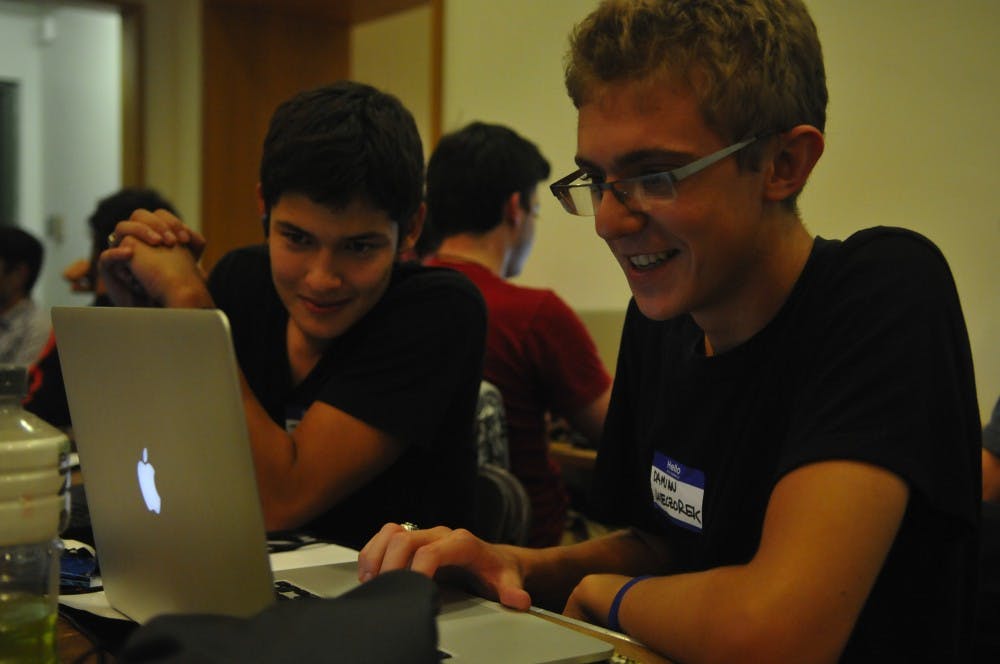
It’s 6 p.m. on Friday. The Hall of Flags is packed with over 300 students. The lights of laptops and tablets illuminate the room, but almost no one is on Facebook because there is work to be done. The sixth PennApps hackathon, hosted by the Dining Philosophers, is no joking matter.
Over the course of 48 hours, these students went without sleeping, socializing or showering to develop an application to be judged by a panel of tech experts.
“We’re pretty much at capacity,” said Wharton and Engineering junior Pulak Mittal, a PennApps organizer. “If you want to stand, this isn’t going to be over in 20 minutes,” he warned.
The kickoff started with a roll call, where a “developer evangelist” asked what schools were present. This year, there were 29 schools represented, including about 150 students from Princeton, Penn State and Carnegie Mellon universities, among others.
The kickoff also featured demos from companies such as Facebook and CloudMine, but the students soon grew impatient as the demos started to cut into their hacking and dinner time.
We had been sitting for two hours. “Better hurry up! Gotta win! 10 minutes past the time hacking was supposed to start!” an anxious hacker yelled.
The scent of food wafted from upstairs and, slowly but surely, laptops were thrown into book bags. The crowd grew smaller as people left to eat or start on their soon-to-be masterpieces.
I caught up with two University of Michigan students who lingered behind. They traveled 11 hours to do something they probably could have done in the comfort of their residence hall.
“It’s the only hackathon that’s accessible to us that gives us access to East Coast schools,” University of Michigan sophomore Tom Erdmann said. “Most hackathons in Michigan, you’ll get people from Michigan State, but never UPenn and Princeton.”
Former Engineering student Jim Grandpre, co-founder and chief architect of the start-up Lore, stayed around to talk about his experience with past PennApps hackathons. He and two other students left Penn in summer 2011 to develop the learning management system startup.
“[When I competed], I think there were about four people who weren’t from Penn,” he said. In the two years since he competed in the hackathon, sponsorships as well as the number of participants have increased.
This year, there were 320 participants and 43 sponsors, including Facebook, Twitter, Dropbox and Lore.
Mittal was very pleased with the turnout. “This event just seems to have exploded,” he said. “I think the brand is solidifying every time and as people enjoy themselves, it keeps growing.”
After the kickoff, the hackers left Houston Hall for Ware College House, the new site for the hackathon, which has traditionally taken place in the Towne Building. The hackathon, which began in fall 2009, is held every semester.
For the next couple of nights, the students fought for space in McClelland Hall, Bodine Lounge and anywhere else they could squeeze in their computers.
The hacking began officially at 8 p.m. When I arrived at the Lower Quad, hoping to catch a glimpse at some “Social Network”-like scene where future Zuckerbergs were hacking away, I was not disappointed. Several coolers full of Red Bull, Vitamin Water and Coke sat at the entrance. Nearly everyone wore headphones and t-shirts with the name of some start-up printed across the chest.
I tried to find someone to speak with.
“Just one question, because I’m sure you’re busy.”
But their looks implied — “Are you seriously asking me that right now?”
I decided it was best to catch them when they weren’t so tied up.
The hacking officially stopped Sunday at noon.
When I returned for the product demonstrations and awards ceremony in the Hall of Flags, everyone was surprisingly alert, except for one lone guy who was knocked out in a chair on the last row.
Each team had 75 seconds to convince the judges and the crowd why their app is the next big thing.
Apps like “CodeDJ Live!”, which was designed by a Penn team, brought a welcome burst of energy to the crowd.
“Sorry, Mom,” described by its developers as “an app that leverages your greatest fear: your mother,” drew laughs with its fun premise. The app allows users to input a task with a time it must be completed. If it isn’t, the app will send an automated text to your mother such as, “Just another day in a string of disappointments.”
After about three hours, the winners were announced. Third place and recipient of $1,000 in prize money went to PassWarp — a login system that strategically creates and changes passwords automatically.
SnapSite.me won second place and $2,000. The app allows companies to take data from their Facebook company page and turn it into a clean website.
First place went to Java Auto Music, an app which allows for live performances to be transcribed into sheet music. The team won $4,000 in addition to a trip to Google’s New York office and entries into the Facebook college hackathon and Greylock Hackfest 2.
JAM developers Jocelin Lee, Ana Mei and Angela Yu, all juniors in Engineering, said they had no expectation of winning. Last year, they weren’t able to finish their project, making this year’s win even more surprising.
Lee looked completely shocked. “This is extremely unexpected and I don’t know why they noticed it,” she said.
“We just used Java, which is really basic programing. We didn’t even use fancy web app stuff, which is why we didn’t expect this at all. I don’t even know what to say about this.”
This article has been updated to reflect that SnapSite.me, not PayTango, was the second place winner.
The Daily Pennsylvanian is an independent, student-run newspaper. Please consider making a donation to support the coverage that shapes the University. Your generosity ensures a future of strong journalism at Penn.
DonatePlease note All comments are eligible for publication in The Daily Pennsylvanian.








